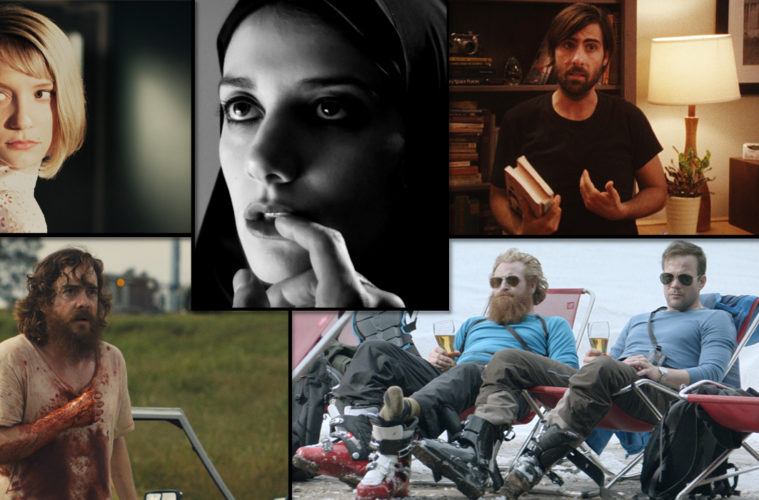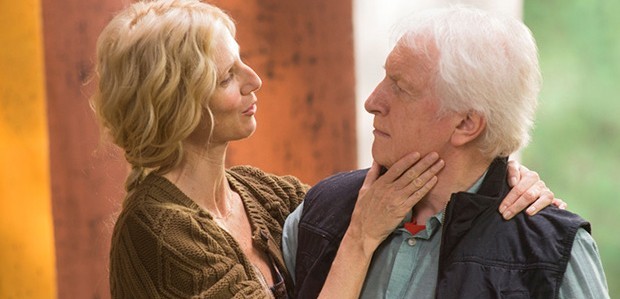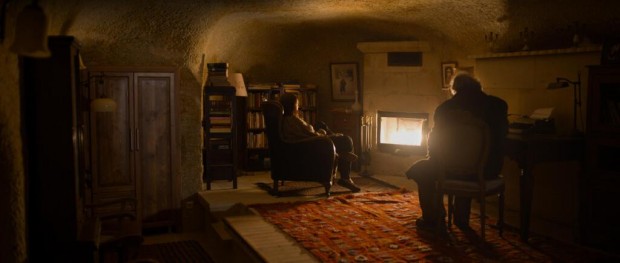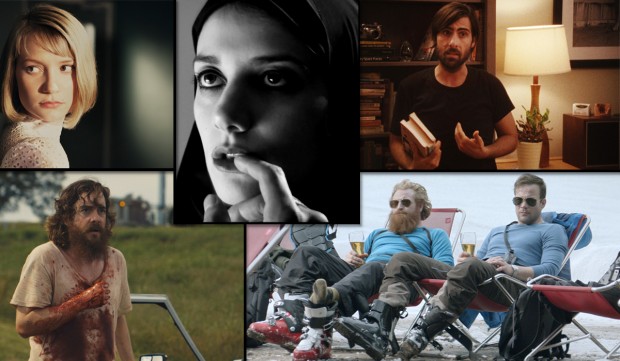
There are a multitude of reasons why any film may get unfairly overlooked. It could be a lack of marketing resources to give it a substantial push, or, due to a minuscule roll-out, not enough critics and audiences to comprise the champions it might require. It could simply be the timing of the picture itself; even in the world of studio filmmaking, some features take time to get their due. With an increasingly crowded marketplace, it means there are more reasons than ever something might not find an audience and, like last year, we’ve rounded up the releases that deserved more attention.
Note that all the below films made less than $1,000,000 at the box office at the time of posting (VOD figures are not accounted for, as they normally aren’t made public) and are, for the most part, left out of most year-end conversations. Sadly, most documentaries would qualify for this list, but we stuck to strictly narrative efforts, and one can read our rundown of the top docs here. Check out the list below and let us know the 2014 films you loved that aren’t getting the recognition they deserve in the comments. A great deal of the below titles are also available to stream, so check out our feature here to catch up.
Abuse of Weakness (Catherine Breillat)
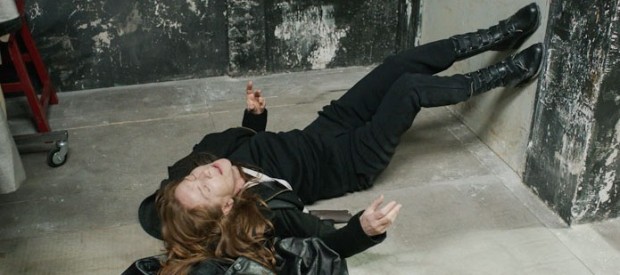
The draw of Catherine Breillat‘s newest, autobiographical film, Abuse of Weakness (known as Abus de faiblesse in its native tongue), is ultimately to watch how someone so desperately in need can be preyed upon no matter their own intelligence, wealth, or stature. When tragedy strikes, unannounced, via a debilitating stroke, the fear of death and paralysis eventually leads to newfound tenacity and strength — but what no one who isn’t absolutely indebted to the help of others for even the most menial tasks (such as opening a door) can know is that the simple act of showing up may prove all-powerful. A friend with the rare quality of not tainting every kindness with a healthy dose of pity is everything. When that person is the only one taking the time to call and visit each day, you can’t really be blamed for doing whatever possible to repay the favor. – Jared M.
A Girl Walks Home Alone at Night (Ana Lily Amirpour)
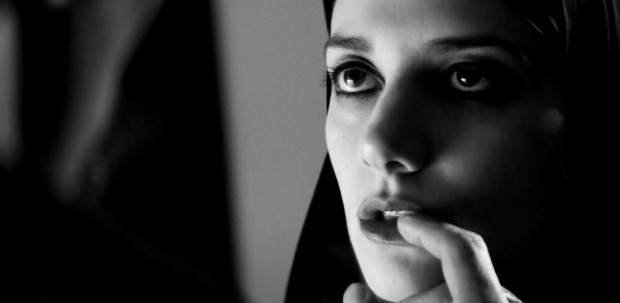
Exuding a sly sense of style and cool, the Iranian vampire film A Girl Walks Home Alone at Night is the striking debut of writer-director Ana Lily Amirpour. From the outset, with one of our main characters, Arash (Arash Marandi), all but calling himself James Dean, I was enraptured. A hipster mentality permeates the fictional Bad City setting, where bodies are simply dumped into a ravine full of other bodies and there’s the mysterious presence of a skateboarding, vinyl-loving female vampire that isn’t afraid to feed. While the film takes its time to fully unwind, I was not yet ready to leave this world when the credits rolled. Hopefully we won’t have to wait long to enter Amirpour’s universe once again. – Bill G.
The Better Angels (A.J. Edwards)
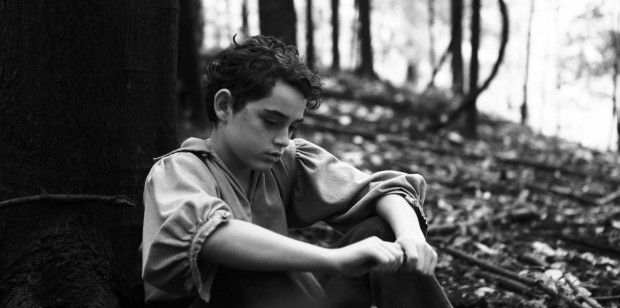
Some directors emerge onto the scene with little prior experience in the industry; that’s certainly not the case for A.J. Edwards. He’d cut his teeth in Terrence Malick’s editing rooms, and the reticent director’s influence is clearly felt in every frame of Edwards’ debut, which tells the story of the early life of Abraham Lincoln. The bookends and a few references are just about the only thing indicating the future importance of our lead, and The Better Angels is determined to make this a more universal coming-of-age story. It’s constructed with the cinema-as-memory approach that Malick has perfected in his later films. While so many others attempt to replicate the style, Edwards is the first filmmaker to effectively summon this technique and make it his own. – Jordan R.
Blue Ruin (Jeremy Saulnier)
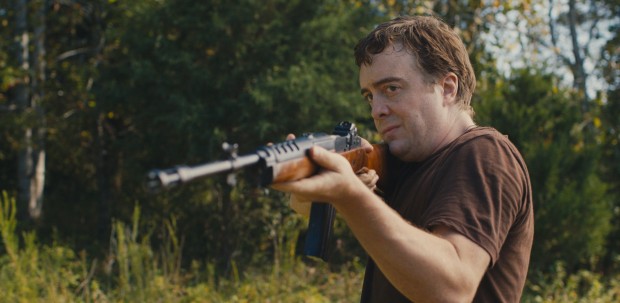
Methodical, patient and unnerving — traits that are fitting a description of its principal character as it is to the overall sense of dread in Jeremy Saulnier’s unflinching revenge thriller. Echoing the vibes of early Coen brothers, specifically Blood Simple, the film’s narrative unravels cautiously, chock-full of fantastically grim surprises that will leave you gasping for air. Blue Ruin, anchored by a chilling performance from Macon Blair, is one of the best examples of a movie stripping away unnecessary genre conventions to bolster its chilling effect. – Raffi A.
The Blue Room (Mathieu Amalric)
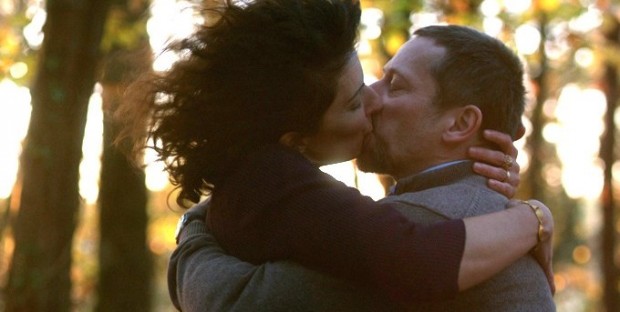
Clocking in at a brisk 75 minutes, the film wastes little time in propelling forward its whodunit? narrative. It begins with two lovers, Julien and Esther (Amalric and Stéphanie Cléau), in a hotel room, their faces often cut out of the frame, their body parts fragmented, their beings usually depicted in isolation. When they both find their way into focus, they barely have enough room for the “classic” 1.33:1 ratio, suggesting isolation and an impending sense of the walls closing in. Heightening this is that, despite the narrower sight, shots nonetheless almost feel as if they may have been composed for 1.85:1 — people are cut-off and closed-in, eye lines are hidden from us, surroundings are short-sighted, and details are easy to miss. – Forrest C.
Borgman (Alex van Warmerdam)
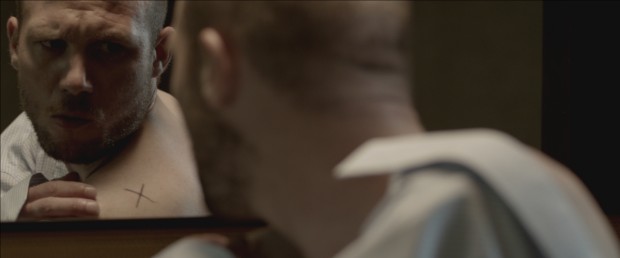
Borgman is a truly original concept for a psychological thriller, where an enigmatic homeless person infiltrates an upper class family. It mixes the creepy oppressiveness of something like Haneke’s Funny Games filtered through the lens of a demonic procedural like Wicker Man. Equal parts mystery as it is dark satire, the experience is both creepy and fun as the motivations behind the titular character become increasingly bizarre. If you’re looking for a unique horror experience, you just gotta go Borgman. – Raffi A.
Closed Curtain (Jafar Panahi)
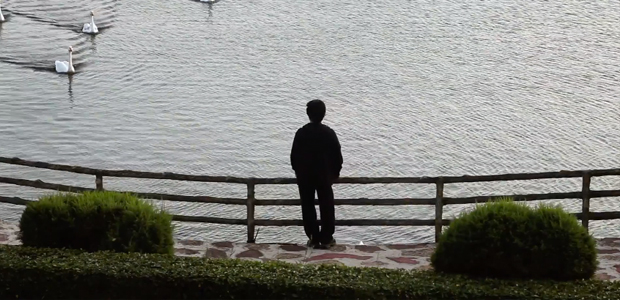
Jafar Panahi, working with co-star Kambuzia Partovi, crafts a spiritual sequel to 2012’s This Is Not a Film that’s deeper, more mysterious, and perhaps even grimmer. What’s initially a close-quarter story of personal redemption grows into a two-headed beast: a documentary on the film you’re seeing and narrative concerning the documentation of said film. But it isn’t traveling down enough rabbit holes so as to eventually be incomprehensible — at least not when the emotional logic guiding one shot to the next is so crystal clear. 2014 offers no better option for fans of meta-textual and political cinema alike. – Nick N.
Coherence (James Ward Byrkit)
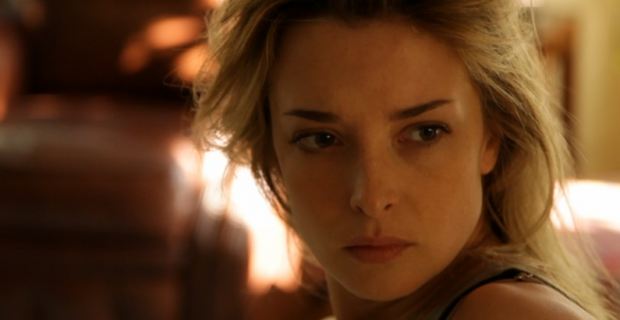
I did an interview earlier this year with producer Dean Silvers, during which I brought up the idea that the availability and affordability of digital filmmaking equipment was ultimately cheapening the art of film, making it too easy to make a film look good. He argued, convincingly, that the ability to make a film look good without as much effort would allow natural storytellers to break through at a lower level of technical availability. Coherence proves him right, weaving a complex, engaging story about the inestimable possibilities of life and the chaos that comes from uncertainty with just single location and a handful of actors. The film hit VOD without much fanfare outside of the usual critic buzz, but I’m hoping that as time goes on it becomes a discovered classic, like Primer before it. – Brian R.
The Double (Richard Ayoade)
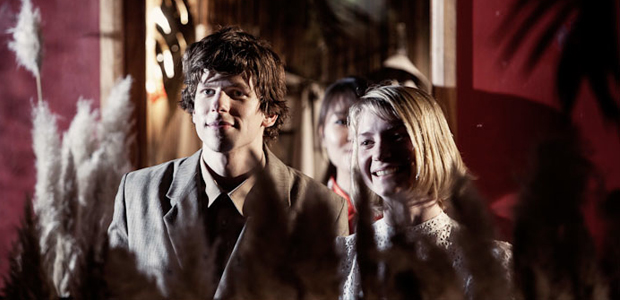
Rarely are comedies this unnerving. Director and co-writer Richard Ayoade creates a world that tortures his protagonist, Simon (Jesse Eisenberg), with sound, sight, and even characters who get excited about the idea of his suicide. Amusement comes at a price in The Double. While it’s an immaculately crafted film, a sense of loneliness is what gives all these (already gloomy) shots a real sense of emotion. Based on his latest and Submarine, Ayoade clearly understands the life of a loner. But it’s also infinitely watchable, thanks to a ton of great laughs. – Jack G.
Force Majeure (Ruben Östlund)

While Force Majeure has drawn easy comparisons to Julia Loktev’s The Loneliest Planet — given their somewhat similar couples-torn-apart-by-life-or-death-situation concepts, as well as rigid festival-film formalism — Östlund actually seems more willing to explore his characters. Instead of coming off a mid-film stunt, the inciting incident of an avalanche is upfront in his first act, letting both a moral drama and a comedy of errors ensue as a marriage crumbles. – Ethan V.
Goodbye to Language (Jean-Luc Godard)
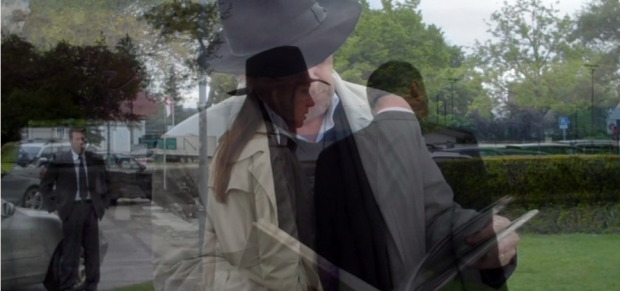
It’s strange to think something from one of the most influential filmmakers of all time could be “overlooked,” but release problems kept this one confined to a smaller space than is justifiable. And, yes, this is the only film to which we’ve awarded a grade of “N/A,” but one should quickly cast off any fears commonly associated with “late Godard.” (In short: that it’s incomprehensible to those without a Master’s degree in philosophy and history, that it’s provocative for the sake of provocation, and / or that it wallows in a contempt for all of Western culture.) One of his most playful and, I dare say, wistful projects is also the most visually astounding film I saw this year. Though it is offering a one-line-after-the-other spurt of dense philosophical ideas, Goodbye to Language is more stimulation than avalanche — a 70-minute trip that, at times, feels like we’re watching over the course of many years. Unfortunately for those who don’t have a 3D TV and good sound system — or at least don’t know someone with as much — Godard’s picture also earns a placement for how much it demands a proper aural-visual system. – Nick N.
God Help the Girl (Stuart Murdoch)
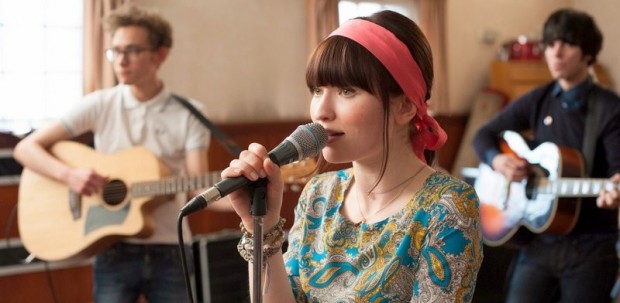
It’s no surprise that Stuart Murdoch’s first film, God Help the Girl, is whimsical and exuberant — much like his long-standing Glasgow pop act, Belle & Sebastian. Filmmaking may be new to Murdoch, but his debut — which displays how songwriting and musicianship becomes a cathartic act for the troubled girl known as Eve (Emily Browning) — is filled with elements he knows: characters sing and dance across the frame, the soundtrack is stuffed with original songs, and there are nods to music’s greatest acts throughout. The fear is that a brightly saturated first film (and a musical no less) will fall apart during its runtime, but Murdoch’s ace in the hole is his lead Emily Browning, who has faded into the noise of previous films like Sucker Punch and Pompeii but is infinitely compelling here. When God Help the Girl feels lost, her slightest glance or smile can save a sequence. In addition, Murdoch’s film channels familiar tropes from Jacques Demy’s work, along with rarer titles like Who Are You, Polly Maggoo? – Zade C.
Grand Piano (Eugenio Mira)
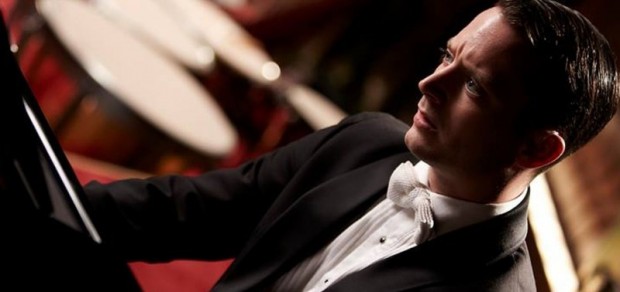
Rarely does a hostage thriller go so far off the rails and yet remain genuinely refreshing all at once. Appropriately, Grand Piano, the latest film from director Eugenio Mira, almost feels like a dare taken to its full conclusion — because, even with a significant skillset, how one can make playing the piano a thrilling and wild event? Answering this question paves the way for a truly filmic picture that embraces the chaos of reality and how well-laid plans can consistently disintegrate once the human element is added. – Bill G.
The Guest (Adam Wingard)
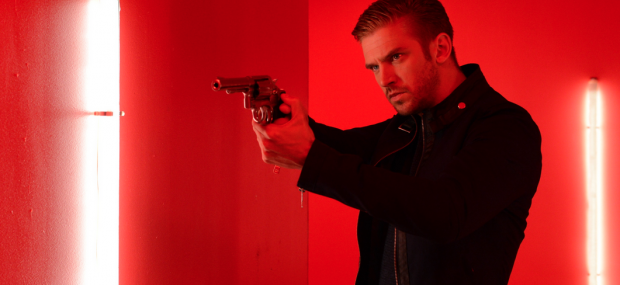
While the influences of The Guest are worn like a badge of honor, the film has its own ambitions. Maika Monroe excels as the straight character that never really succumbs to Dan Stevens’ wicked charms as the former soldier paying his respects to the family of a fallen comrade. The film is peppered with synth-heavy musical cues and there’s a nice sense of style throughout. By the time the film turns into a full-blown thriller, you are so entranced that you forget that there was ever a bump in the road at the half-way point in the film. Violent, hilarious, and with a throwback vibe, The Guest simply works if you’re looking for a good time. – Bill G.
Hide Your Smiling Faces (Daniel Patrick Carbone)
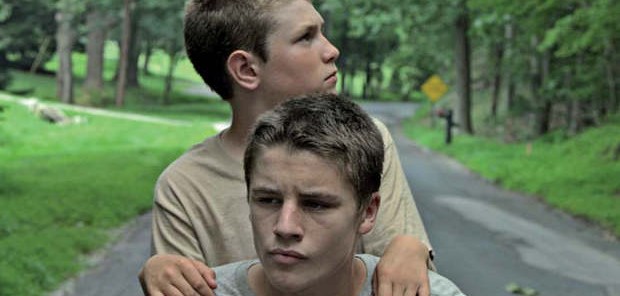
Helmer Daniel Patrick Carbone combines gorgeous locations and subtle performances to depict the emotional struggle of two young brothers dealing with a tragic death against the backdrop of rural New Jersey. In his debut feature, Carbone demonstrates an impressive style that exalts the attributes of low-budget indie cinema — an isolated setting, naturalistic dialogue, deliberate pacing — to produce a truly affecting coming-of-age portrait of grief and vulnerability. – Amanda W.
It Felt Like Love (Eliza Hittman)
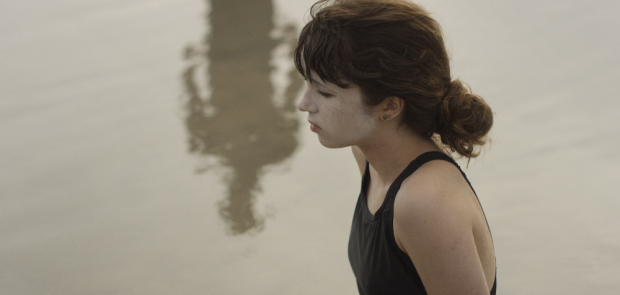
Proof that the coming-of-age story still has a place in film, despite its countless incarnations, It Felt Like Love is a tenderly observed debut from Eliza Hittman. Venturing into areas of Brooklyn not often captured this authentically, we follow Lila (Gina Piersanti), a teenager who awkwardly (and, therefore, relatably), traverses her burgeoning sexuality. It’s a textured, warm work from Hittman, and the great news is that she’s already developing her follow-up, the “anti-Juno” story of “a young pregnant woman who comes to New York.” – Jordan R.
Jealousy (Philippe Garrel)

To note its mixture failed romances, the effect this has on a parent-child relationship, and its high-contrast black-and-white photography should make clear that, yes, Jealousy is melancholy to the nth degree, but Philippe Garrel’s latest wouldn’t work if it didn’t balance these components with moments of sublimity. And if a 76-minute runtime just doesn’t feel like enough, the wispy structure is built upon enough suggestive pieces to let your mind fill in some of the gaps, create new possibilities with each subsequent consideration, and yet never reach a full-fledged understanding. That’s more than you can say for almost anything released this year. – Nick N.
Land Ho! (Aaron Katz, Martha Stephens)
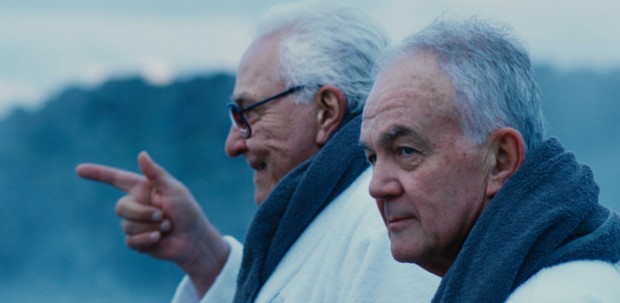
Following his break-out performance in last year’s restrained Sundance drama This is Martin Bonner, the talented Paul Eenhoorn has returned to the festival with Land Ho!, a lovely, hilarious, and beautifully photographed road trip comedy. While Eenhoorn provides the tender, more reserved half of the duo as Colin, it’s his ex-brother-in-law, Mitch (Earl Lynn Nelson), who steals the show as a foul-mouthed, perpetually horny, pot-smoking, recently retired doctor. – Jordan R.
Like Father, Like Son (Hirokazu Koreeda)

Known for his intimately personal style of filmmaking and, often, drawing from his own experiences, there are always tugged emotional heartstrings that permeate the core of Hirokazu Koreeda’s films. With his latest title, Like Father, Like Son, the Japanese director drew from his experience of becoming a father to craft an intensely poignant film about parenthood. Oftentimes heart-wrenching, Koreeda is able to weave a range of emotions by remaining slightly detached and observing the subtle mannerisms of both families; with such great performances from both of the child actors, it’s near-impossible not be bowled over by their struggle to understand what’s happening. – Raffi A.
Life of Riley (Alain Resnais)
How sad that two figureheads of the French New Wave managed to put out new films in 2014, see them released in New York at the same time, and go underexposed. Life of Riley was granted about as little as any film can get in a theatrical release — unless you were in New York City, Americans were almost completely shut out — which is all the more reason to look out for this, the final film from Alain Resnais. And what a film, evidence that, at 92, he was still finding new ways to bend supposedly well-known distinctions between subjective emotion and the boundaries of reality, here expanding upon the close of You Ain’t Seen Nothin’ Yet. It, like that recent masterpiece, is mordantly funny throughout, and whatever cloud might hang over its final moments — culminating in about as definitive a bow as any film artist could take — is only rendered lovely in the context of a creator’s passing. – Nick N.
Listen Up Philip (Alex Ross Perry)
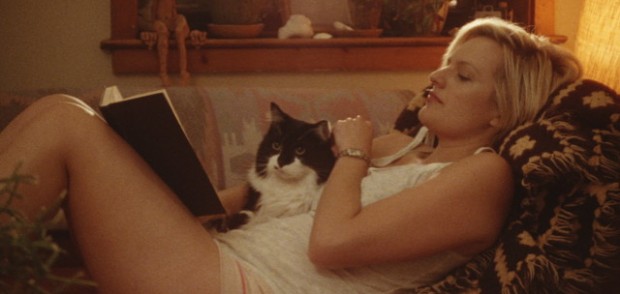
Along with being one of the year’s great achievements in every possible respect — and always confident, never ostentatious in its presentation of as much — Listen Up Philip represents, as one of our writers has already noted, a much-needed galvanization of independent American cinema’s supposedly “edgy” side. For as bitter and dark a worldview as it might sometimes express, I couldn’t help but find its effortless mixture of these qualities with a consistent, fair-minded eye a breath of fresh air, and it’s only been rewarded with subsequent visits. A film of considerable strength that you could probably show your family — so long as they know how to take a good wheelchair joke. – Nick N.
Miss Julie (Liv Ullmann)
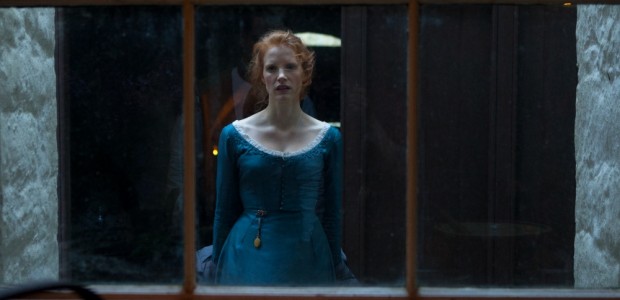
It’s no great surprise that a screen legend’s latest behind-the-camera effort would result in one of 2014′s finest actor showcases. Miss Julie, as directed by Liv Ullmann, takes place almost entirely in one home — and about 80% of its time in that home is centered in a single room — and often consists of no more than Jessica Chastain and Colin Farrell attempting to one-up each other in tantalizing games of cat and mouse. Someone who boasts a decades-long familiarity with dialogue-heavy movies can orchestrate strong performances? Again: no surprise. But while you might think this, alone, would make for a worthwhile time, her adaptation is also a triumph of staging and cutting, where Ullmann translates August Strindberg‘s classic play with a visual intelligence that makes the leads’ sparring as electrifying as anything that hit multiplexes this year. – Nick N.
Norte, the End of History (Lav Diaz)
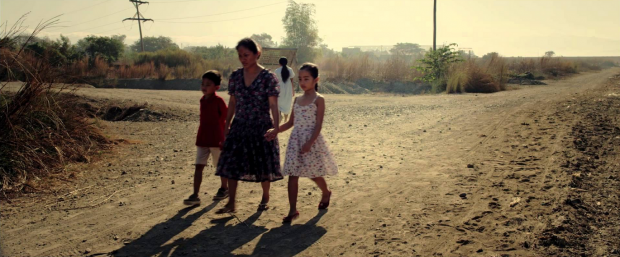
While Lav Diaz’s Norte, the End of History may not be easily classified or explained — it could be summarized in terms of basic narrative trappings, but not as far as intent or accomplishment are concerned — it conjures an intoxicating psychology, transplanting all of its socio-political concerns through the eyes of characters so wholly realistic that we feel we’ve actually met them. Diaz, whose works are known both for their langorous observations of very human systems and their overwhelming attention to spiritual / psychological details, has concieved a work as ambitious as any made by the humanist directors of yester-year. (Kenji Mizoguchi particularly comes to mind.) Drawing some of his inspiration from Dostoevsky’s Crime and Punishment, Diaz tells one encompassing story from three essential viewpoints, although the summation of these interspections are more thematic than narrative, introducing us to characters who wind up on different spectrums and on different receiving ends of various social pressures that exist within the Phillipines. The film’s extensive running time — upwards of four hours, and with nary a shot or moment I can imagine cutting — and Diaz’s own distinctive, hypnotic visual style — long master shots and intuitive relocations of space — do make Norte something of a challenge, but it’s been a long time since a filmmaker rewarded with so much in exchange for our patience. – Nathan B.
Night Moves (Kelly Reichardt)
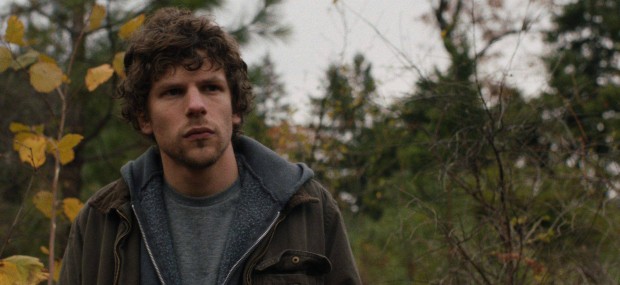
There’s not a lot of room for slow-burn, methodical thrillers nowadays. We have superheroes to contend with, and in a year where buildings and flying aircraft carriers get blown up as a matter of course there might not be much need for a movie that contemplates the destruction of a single, small dam. Yet Night Moves, the new film by Kelly Reichardt, takes just this tact, following three environmental crusaders (Jesse Eisenberg, Dakota Fanning, and Peter Sarsgaard) as they plan and attempt to execute a minor act of terrorism. The focus on the minor details and the lingering concerns of the act makes this an unbearably tense movie that segues perfectly into a third act focused on the fallout of the attempt in a moral and spiritual way. Crime isn’t easy, and neither is being a criminal. This movie gets it, but sadly its quiet contemplation was drown out by some more boisterous voices at the box office. – Brian R.
Nymphomaniac (Lars von Trier)
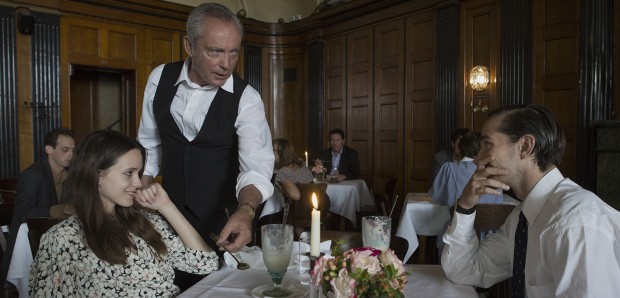
The magnum opus from Lars von Trier, one of cinema’s most controversial figures, is a virtual tome of fascinating musings on the nature of sexuality. While sometimes tiresome to watch with dialogue bathed in pretension, the film does offer some genuine insightfulness into the perversion of obsession. It’s also oddly self referential to the canon that von Trier has created for himself, skewering his own films and themes sometimes to the point of parody. But despite all it’s flaws, it’s still one of the most captivating films to come out this year, even if it can be infuriating. – Raffi A.
The One I Love (Charlie McDowell)
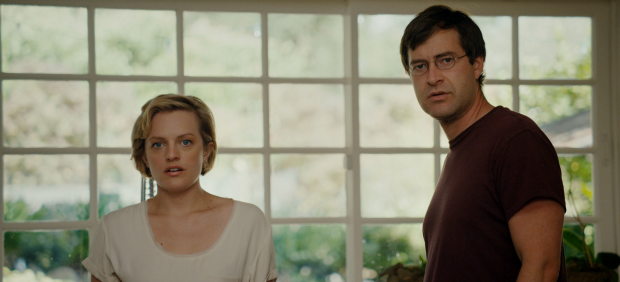
A film with a major turn only 15 minutes in will always be a hard sell, but what will keep an audience enthralled is if there is meat to that twist and the pay-offs afterward. Thankfully The One I Love has that covered as Elisabeth Moss and Mark Duplass are excellent as lovers that decide to take their marriage counseling to another level with a trip to a secluded penthouse suggested by their marriage counselor. There they find all that they could ever want, and much more than they ever thought imaginable. Where the film excels is that it has such a limited scope and scale and an ambiguity to the plot twists that you settle in for a ride that leaves more questions than answers. Filling in the blanks has never been this much fun in a relationship comedy that has genre trappings. – Bill G.
Song of the Sea (Tomm Moore)

Song of the Sea, the latest animated feature from The Secret of Kells director Tomm Moore, opens with a dreamlike sequence that quickly lays the foundation for most of what is to follow, both thematically and narratively. The traditional, handcrafted animation that Moore is again working with gives the movie a distinct, yet classically appealing aesthetic that visually distinguishes it from the variety of other animated offerings we’ve seen of late. The depth of the environments is truly remarkable, a layering of complex details and visual flourishes juxtaposed against the simpler design of the central characters. The nighttime sequences are somehow even more impressive as the images glow with such clarity as to almost create a 3D effect. – Brian P.
Starred Up (David Mackenzie)
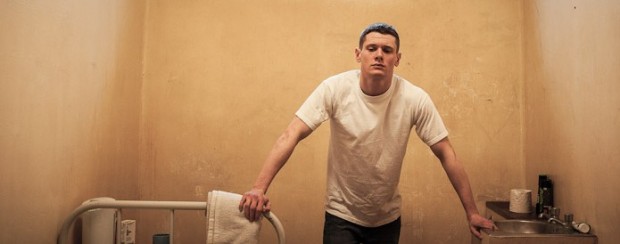
In an opening sequence, as he’s arriving to adult prison, Eric (Jack O’Connell) is given a thorough inspection in a moment that clues us in to the kind of movie Starred Up will be: a no-holds barred, explicit exploration of prison culture. Directed by David Mackenzie (Mister Foe, Perfect Sense), Starred Up is a more extreme and, often, more exciting exploration of themes MacKenzie has previously tackled. Eric, a violent drifter of sorts, grows up without a proper parent, learning to fend for himself — and, in a later scene, we learn the exact consequences of this and how it got him to this present state. Eric, for the first time in his adult life, meets his father, Neville (Ben Mendelsohn), a hardened criminal who encourages his son to play the game. A product of the “system,” he wants Eric to simply go along, keep his head down, and get out. Needless to say, it’s an irritation when his son starts making connections and plans. – John F.
Stray Dogs (Tsai Ming-liang)
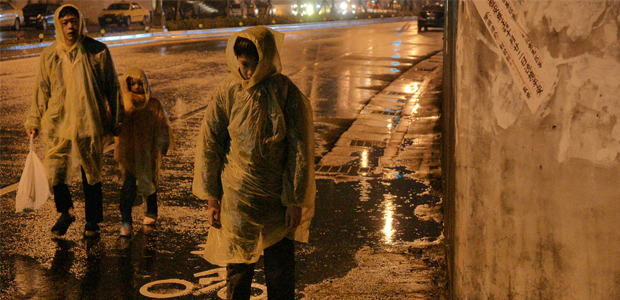
That one of 2014’s very best films only arrived on a few screens is made all the more disheartening in context: an international master angling toward his final statement via fiercely critical examinations of economic disparity and personal humiliation. Words such as “bracing” are thrown around willy-nilly as a means of describing any half-decent film that dares to so much as look social issues in the eye; Stray Dogs, though fully embracing slow-cinema staples (this only further enabled by its use of digital cinematography), is more of an angry howl baffled at and irate with a modern state which none of us are capable of changing. – Nick N.
Stranger by the Lake (Alain Guiraudie)
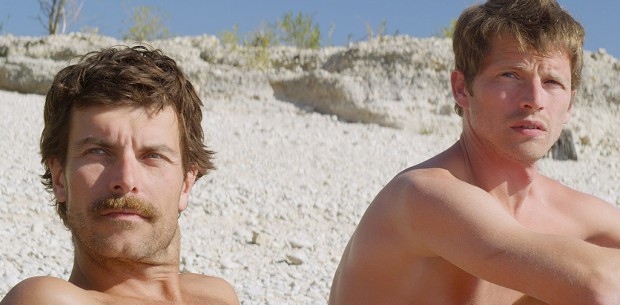
Explicit sex, shocking turns, and a nail-biting finale all filtered through an austere eye with clear knacks for composition and rhythm — what’s not to like? The whole “explicit” aspect didn’t help any attempts to get a theatrical spotlight, but the French thriller has found a comfortable home on Netflix. Just be cautious about who’s around (and who’s looking at the “Recently Watched”) before you give it a (ahem) shot. – Nick N.
The Strange Little Cat (Ramon Zürcher)
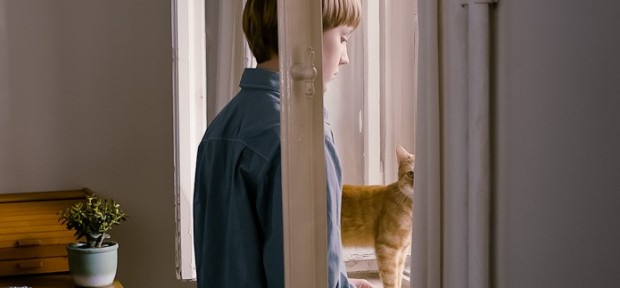
Running a brief 72 minutes, The Strange Little Cat will require multiple viewings, but ones which will pass by briskly and pleasurably so. Its aesthetic gambits are at once obvious and yet perplexingly complex, its tone a playful register mixed with sudden moments of melancholy, and its narrative at first shallow, but soon revealed to be densely layered. While some have criticized the Berlin School — the filmmaking movement that has bred terse, methodical directors like Barbara’s Christian Petzold, Everyone Else’s Maren Ade, and In the Shadows’ Thomas Arslan— Ramon Zürcher’s debut feature feels like a bold step towards something much warmer and amiable than any of these noted “contemporaries.” Given the subtlety of its narrative, questions of whether this congeals into something substantial might be up for further debate, but I’m willing to give this unquestionably unique work a very strong benefit of the doubt when the rigor of its filmmaking leads toward so many unexpected pleasures. – Peter L.
The Tale of The Princess Kaguya (Isao Takahata)
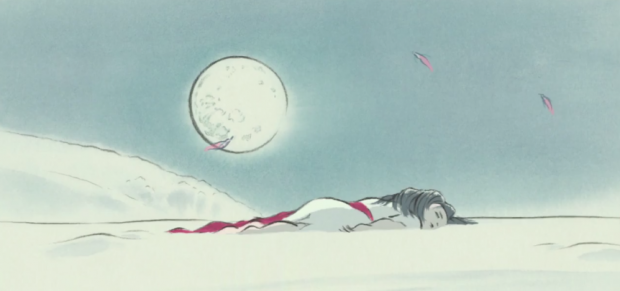
In an era where the aesthetics of animation uphold the crafting of a stunning amount of detail into the image, one of the most genuine pleasures to be found in The Tale of Princess Kaguya — the first film by Studio Ghibli auteur Isao Takahata in fourteen years, and likely his last — is not that each frame bursts with multitudes of details, but with barely the minimum. It is often as if the colors of the background are unfinished, every shot like a brief sketch than something meticulously worked over. In an era where anime films seem to blend into each other aesthetically, Takahata’s impressions seems marvelously alive — its modesty in images makes them feel as if they’re being created before our very eyes. – Peter L.
They Came Together (David Wain)
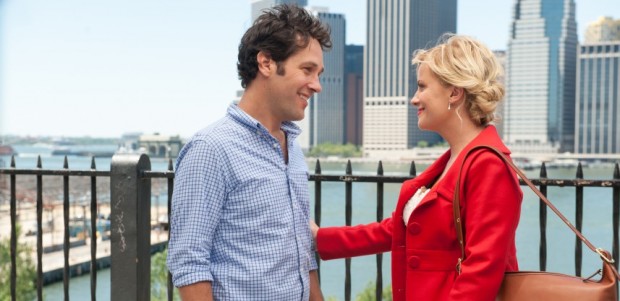
The subject of well-deserved lamenting, we’ve seen a number of films subvert or subtly ridicule Hollywood’s generic romantic comedy genre, but the parody to end them all has arrived with They Came Together. In an era where much of the spoof genre simply lazy repeats scenarios, David Wain‘s latest comedy brilliantly and hilariously deconstructs every aspect of the genre to provide the funniest film one is bound to see this year. – Jordan R.
Venus in Fur (Roman Polanski)
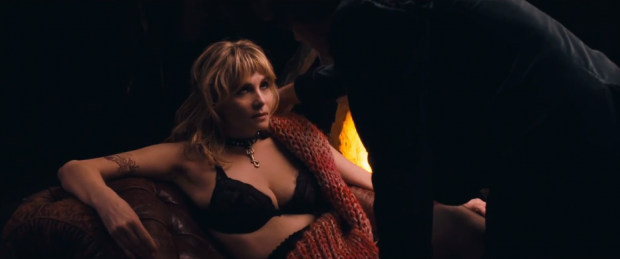
Roman Polanski hasn’t made anything so straightforwardly funny since The Tenant — this is said as someone who finds both Bitter Moon and Frantic screamingly hilarious — and it even goes right back to that 1976 film’s territory in its final moments, the director’s doppelgänger and real-life spouse ending their sexual cat-and-mouse game with a bit of emasculation. So tightly controlled in each shot, cut, and gesture and yet with a boundless sense of freedom and possibility, it’s the kind of great film that unrolls to deliriously consistent effect. – Nick N.
Why Don’t You Play In Hell? (Sion Sono)

Excessive doesn’t begin to describe Why Don’t You Play In Hell?, Japanese director Sion Sono’s action comedy that focuses on two gangsters and an aspiring director. Jam packed with shoot-outs, katana battles, and martial arts, the film culminates in a sopping wet mess of blood, sweat, and vomit, but not before making the viewer earn it. – Amanda W.
We Are the Best! (Lukas Moodysson)
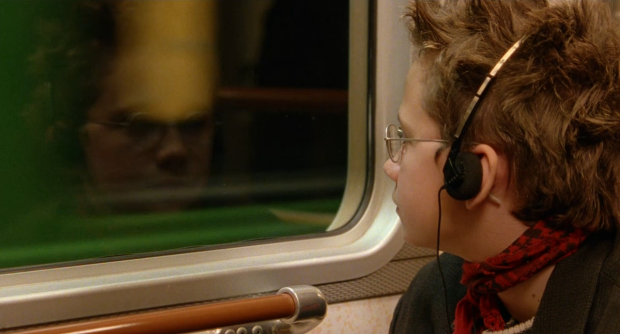
The opening title card to Lukas Moodysson’s joyous and vibrant film We Are the Best! reads, “Stockholm 1982” while early scenes consist of idle discussions about taxes and arguments about the laundry. These opening minutes suggest that “Stockholm 1982” is a city populated with older residents entrenched in rigorous domesticity. Bobo (Mira Barkhammar) and Klara (Mira Grosin), our thirteen-year-old heroines, want no part of this world. They sport botched mohawks and hide their femininity behind thick glasses and baggy clothing. Their greatest act of defiance is their affinity for punk music — a trend, they are promptly reminded by their angelic-looking classmate, that’s long been dead. – Zade C.
Wetlands David Wnendt)
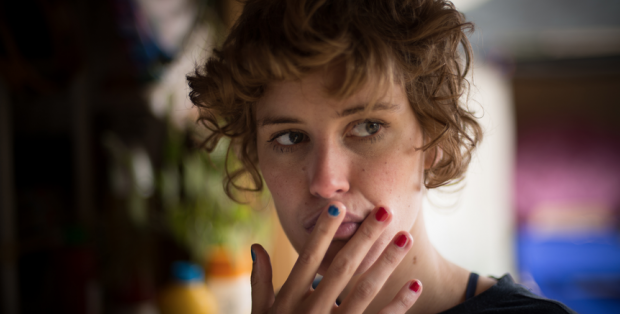
The grossest gross-out comedy of the year, and one of the rare films I’ve seen that has truly shocked me. Adapted from Charlotte Roche’s novel by David Wnendt, Wetlands is one of the year’s best (and not be confused by a 2011 French-Canadian masterpiece of the same name), no subject is taboo in this picture including sex, hygiene, gender, and identity. Fronted by Carla Juri as Helen, a young women with chronic anal fissures and heroine who answers questions we might be afraid to ask without a filthy mind and an open heart. Love is a battlefield, and Wetlands is a coming-of-age story that’s opening credits alone I suspect would shock and delight John Waters. – John F.
Winter Sleep (Nuri Bilge Ceylan)
A brutal portrait of a man, Winter Sleep, for three hours and seventeen minutes, plunges us into Aydin’s thoughts, logic, and feelings as he slowly comes to understand the personality he’s developed over the years. It’s an interesting step for Ceylan, who, after becoming the primary arbiter of Turkish cinema around the globe, seems to be entertaining his own version of Bergman’s Scenes from a Marriage. He has not lost a focus on the elemental beauty of environment that made both Climates and Once Upon a Time in Anatolia so thrilling, but while Anatolia felt content to be more of a philosophical rumination that only approached the essential nature of its characters when nearing a conclusion, Winter Sleep finds a way to weave these threads simultaneously. – Peter L.
Young & Beautiful (François Ozon)
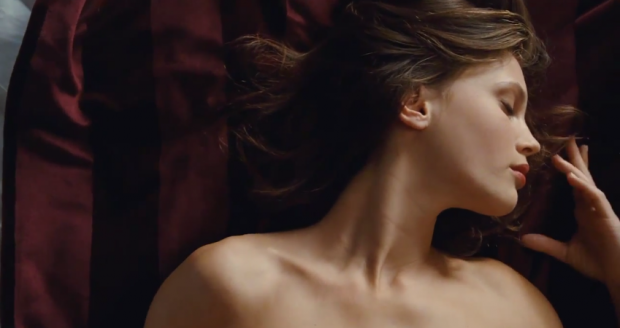
Riffing on such classics as Vivre Sa Vie and Belle de Jour, François Ozon‘s Young & Beautiful doesn’t examine its themes as deeply as one might hope, but it does deliver a stirring break-out performance from Marine Vacth. Portraying a teenager who takes up being a call girl, it’s a gripping evolution to witness, and we look forward to seeing what she’ll take on next. Perhaps its spring release was poorly timed for being right around Nymphomaniac, but this one didn’t quite get the attention it deserved. – Jordan R.
Zero Motivation (Talya Lavie)
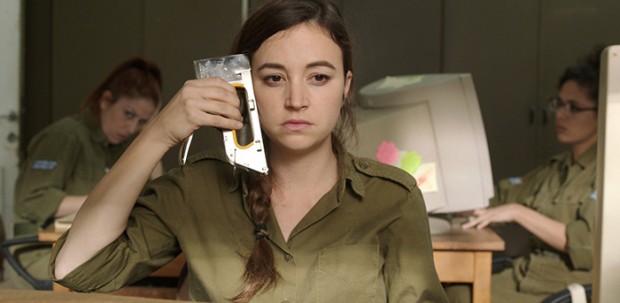
Delicately shifting from laugh-out-loud comedy to complicated issues such as suicide and rape, this debut from Israeli director Talya Lavie is one of the year’s most accomplished. While the backdrop of the military adds an integral dramatic layer, Zero Motivation could easily double as an office comedy, following a group of female IDF soldiers who find inventive and occasionally destructive ways to help their mandatory situation pass. With her debut, Lavie steps out as an assured and original voice, perfectly balancing deadpan humor with heartfelt emotion. – Jordan R.
What’s your favorite overlooked film this year?

